Egypt and Liberia have signed a memorandum of understanding (MOU) to collaborate on aquaculture development, officials announced. The agreement, signed Monday by the Egyptian Lake Protection and Fish Resources Development Authority (LPRDA) and Liberia’s National Fisheries and Aquaculture Authority (NFAA), aims to boost sustainable development and economic integration in the fisheries sector.
Strengthening African Partnerships
The collaboration is part of a broader Egyptian effort to strengthen partnerships with African nations. Egyptian political leaders have actively promoted cooperation across the continent, addressing issues including peace and security, counter-terrorism, conflict resolution, and the economic impacts of global events like the COVID-19 pandemic and the war in Ukraine, as well as climate change and food security. This aligns with the goals of Agenda 2063, the African Union’s strategic framework for socioeconomic transformation.
For Egypt, enhancing relationships with fellow African nations is pivotal for its foreign policy. Partnerships like this one with Liberia emphasize mutual development and highlight Egypt’s commitment to fostering unity within the continent. By focusing on sectors such as agriculture and aquaculture, Egypt aims to not only drive economic progress but also address critical issues such as food security and climate resilience.
Key Focus Areas of the Agreement
The MOU between the LPRDA and the NFAA outlines several critical areas of cooperation:
- Improving Governance in Aquaculture: Both nations aim to establish transparent regulatory frameworks that ensure the sustainability of aquaculture practices.
- Combating Illegal Fishing Practices: The partnership will focus on curbing practices that deplete fish stocks and harm marine biodiversity.
- Fostering Aquaculture Development: By sharing expertise and technology, Egypt and Liberia aim to enhance fish farming practices and increase production.
- Strengthening Scientific Research: Collaborative research initiatives will address challenges in aquaculture, such as disease management, feed development, and breeding programs.
- Promoting Trade: Both countries aim to enhance trade in fish and seafood products, creating new economic opportunities for local communities.
Egypt’s Leadership in Aquaculture
Hussein Farahat, executive director of the LPRDA, welcomed the agreement, emphasizing the significance of the fisheries sector to Egypt’s food security and sustainable development goals. Egypt is a leader in aquaculture in Africa, producing over 1.6 million tons of fish annually, making it the largest producer on the continent and the sixth-largest globally. Farahat highlighted the country’s expertise in lake and fisheries management and expressed Egypt’s commitment to providing technical and logistical support to African nations.
Egypt’s geographical location, bordered by the Mediterranean and Red Seas, gives it a strategic advantage in the fishing and aquaculture industries. The country has invested heavily in modernizing its aquaculture sector through initiatives such as the establishment of fish farming zones and the development of integrated aquaculture systems. These advancements position Egypt as a valuable partner for nations like Liberia seeking to develop their fisheries sector.
Liberia’s Aquaculture Ambitions
Emma Catherine Metieh, director general of the NFAA, expressed her satisfaction with the agreement, noting its alignment with Liberia’s “ARREST” development agenda. This framework prioritizes agriculture, including aquaculture, as a means of driving economic growth and improving livelihoods. Metieh highlighted Liberia’s commitment to creating a favorable environment for investment in aquaculture by providing incentives and addressing infrastructural challenges.
Liberia, though endowed with significant water resources, has struggled to fully harness its aquaculture potential. The country’s fisheries sector contributes significantly to food security, yet challenges such as inadequate infrastructure, limited access to finance, and overfishing hinder its growth. Through this partnership with Egypt, Liberia aims to overcome these obstacles by leveraging Egyptian expertise and technology.
Enhancing Regional Food Security
The partnership between Egypt and Liberia is expected to have a positive impact on regional food security. Fish is a vital source of protein in many African countries, and sustainable aquaculture can help bridge the gap between supply and demand. By adopting best practices in fish farming and resource management, both nations can increase production while preserving their natural ecosystems.
According to the United Nations Food and Agriculture Organization (FAO), Africa’s fish consumption is expected to rise significantly in the coming decades, driven by population growth and changing dietary preferences. However, the continent’s fish production is not keeping pace with demand, leading to increased reliance on imports. Initiatives like the Egypt-Liberia collaboration are crucial for addressing this imbalance and reducing Africa’s dependence on external markets.
Leveraging International Cooperation
The signing ceremony was attended by key officials from both nations, including Osama Mohammed Eissa from Egypt’s Ministry of Planning and Economic Development and Zizi A.S. Kpadeh from Liberia’s NFAA. The presence of high-ranking officials underscores the importance of the agreement and the shared commitment to its successful implementation.
Egypt’s dedication to African cooperation extends beyond bilateral agreements. The country has been actively involved in continental initiatives aimed at addressing shared challenges. For instance, Egypt plays a leading role in the African Continental Free Trade Area (AfCFTA), which seeks to enhance trade and investment across the continent. By integrating aquaculture development into broader economic strategies, Egypt and Liberia are contributing to the realization of AfCFTA’s goals.
Opportunities for Private Sector Involvement
The MOU also opens doors for private sector participation in the aquaculture industry. Egyptian companies specializing in aquaculture technology, fish feed production, and logistics can explore opportunities in Liberia’s emerging market. Similarly, Liberian entrepreneurs can benefit from access to Egyptian expertise and resources, fostering innovation and job creation.
Public-private partnerships (PPPs) are expected to play a significant role in the implementation of the agreement. By combining the strengths of government institutions and private enterprises, both countries can accelerate the development of their aquaculture sectors and achieve long-term sustainability.
Addressing Climate Challenges
Climate change poses a significant threat to fisheries and aquaculture in Africa. Rising sea temperatures, ocean acidification, and unpredictable weather patterns disrupt fish habitats and breeding cycles. The Egypt-Liberia partnership emphasizes the importance of resilience in aquaculture practices to mitigate these impacts.
Collaborative research efforts will focus on developing climate-smart aquaculture systems that minimize environmental impact while maximizing productivity. These innovations are essential for ensuring the sustainability of fish stocks and the livelihoods of communities dependent on fishing.
Building Capacity Through Training
Capacity building is a central component of the MOU, with Egypt committing to provide training and technical assistance to Liberian stakeholders. This includes workshops on sustainable aquaculture practices, resource management, and value chain development. By equipping Liberian professionals with the skills and knowledge needed to manage their fisheries sector effectively, the partnership ensures lasting benefits for both nations.
Training programs will also address gender disparities in the aquaculture industry. Women play a crucial role in fish processing and marketing, yet they often face barriers to accessing resources and opportunities. Empowering women through targeted initiatives can enhance the inclusivity and impact of the partnership.
Conclusion
The Egypt-Liberia aquaculture cooperation agreement marks a significant milestone in African development. By combining their strengths and resources, the two nations are setting an example of how regional partnerships can drive sustainable growth and address shared challenges. The MOU not only benefits Egypt and Liberia but also contributes to broader efforts to enhance food security, economic integration, and resilience across the continent.
As the partnership unfolds, its success will depend on effective implementation, continuous collaboration, and the active involvement of stakeholders at all levels. With the right strategies and commitment, the Egypt-Liberia agreement has the potential to transform the aquaculture landscape in Africa and pave the way for a more prosperous and sustainable future.
Ready to take your career to the next level? Join our dynamic courses: ACCA, HESI A2, ATI TEAS 7 and HESI EXIT !🌟 Dive into a world of opportunities and empower yourself for success. Explore more at Serrari Ed and start your exciting journey today! ✨
photo source: Google
By: Montel Kamau
Serrari Financial Analyst
27th November, 2024
Article, Financial and News Disclaimer
The Value of a Financial Advisor
While this article offers valuable insights, it is essential to recognize that personal finance can be highly complex and unique to each individual. A financial advisor provides professional expertise and personalized guidance to help you make well-informed decisions tailored to your specific circumstances and goals.
Beyond offering knowledge, a financial advisor serves as a trusted partner to help you stay disciplined, avoid common pitfalls, and remain focused on your long-term objectives. Their perspective and experience can complement your own efforts, enhancing your financial well-being and ensuring a more confident approach to managing your finances.
Disclaimer: This article is for informational purposes only and does not constitute financial advice. Readers are encouraged to consult a licensed financial advisor to obtain guidance specific to their financial situation.
Article and News Disclaimer
The information provided on www.serrarigroup.com is for general informational purposes only. While we strive to keep the information up to date and accurate, we make no representations or warranties of any kind, express or implied, about the completeness, accuracy, reliability, suitability, or availability with respect to the website or the information, products, services, or related graphics contained on the website for any purpose. Any reliance you place on such information is therefore strictly at your own risk.
www.serrarigroup.com is not responsible for any errors or omissions, or for the results obtained from the use of this information. All information on the website is provided on an as-is basis, with no guarantee of completeness, accuracy, timeliness, or of the results obtained from the use of this information, and without warranty of any kind, express or implied, including but not limited to warranties of performance, merchantability, and fitness for a particular purpose.
In no event will www.serrarigroup.com be liable to you or anyone else for any decision made or action taken in reliance on the information provided on the website or for any consequential, special, or similar damages, even if advised of the possibility of such damages.
The articles, news, and information presented on www.serrarigroup.com reflect the opinions of the respective authors and contributors and do not necessarily represent the views of the website or its management. Any views or opinions expressed are solely those of the individual authors and do not represent the website's views or opinions as a whole.
The content on www.serrarigroup.com may include links to external websites, which are provided for convenience and informational purposes only. We have no control over the nature, content, and availability of those sites. The inclusion of any links does not necessarily imply a recommendation or endorsement of the views expressed within them.
Every effort is made to keep the website up and running smoothly. However, www.serrarigroup.com takes no responsibility for, and will not be liable for, the website being temporarily unavailable due to technical issues beyond our control.
Please note that laws, regulations, and information can change rapidly, and we advise you to conduct further research and seek professional advice when necessary.
By using www.serrarigroup.com, you agree to this disclaimer and its terms. If you do not agree with this disclaimer, please do not use the website.
www.serrarigroup.com, reserves the right to update, modify, or remove any part of this disclaimer without prior notice. It is your responsibility to review this disclaimer periodically for changes.
Serrari Group 2025
















